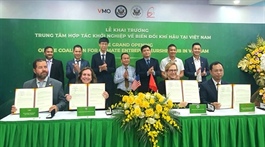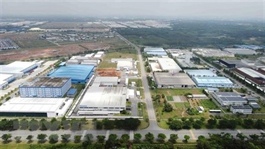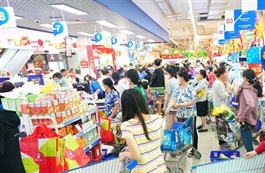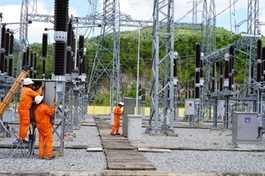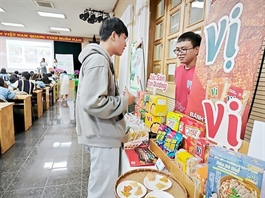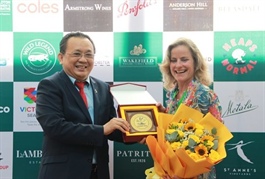More than $20 billion of foreign investment capital registered in Việt Nam in 9 months
More than $20 billion of foreign investment capital registered in Việt Nam in 9 months
Foreign investment capital into Việt Nam continues its increasing trend, with US$20.21 billion in nine months, a year-on-year growth of 7.7 per cent.
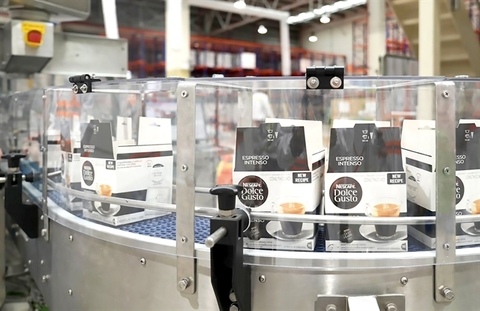
Coffee capsule production line of Nestlé Việt Nam. — VNA/VNS Photo |
Disbursed capital also reached more than $15.9 billion, an increase of 2.2 per cent.
Data from the Foreign Investment Agency (FIA) under the Ministry of Planning and Investment (MPI) showed that the total newly-registered foreign investment capital, adjusted and contributed capital to buy shares, and buy contributed capital of foreign investors reached approximately $20.21 billion as of 20 September this year, up 7.7 per cent year-on-year.
Of these, 2,254 new projects were granted investment registration certificates, with more than $10.23 billion, an increase of 66.3 per cent in the number of projects and 43.6 per cent in capital compared to the same period last year.
Additionally, 934 projects registered to adjust investment capital, with a total additional capital of more than $5.15 billion, a growth of 21.5 per cent in number and a decrease of 37.3 per cent in capital compared to the same period last year.
Furthermore, there were 2,539 capital contributions and share purchases, with a total capital contribution value of more than $4.82 billion, down 5.9 per cent in number and up 47 per cent in capital compared to the same period.
The drastic solutions of the Government and the Prime Minister in the first months of the year have been effective in supporting and removing difficulties for businesses to disburse investment capital, said FIA.
Moreover, adjusted investment capital continues to show improvement month by month compared to the first months of the year.
The number of adjusted capital projects also maintained an increase over the same period, affirming investors' confidence in Việt Nam's investment environment and continuing to make decisions to expand existing projects.
FIA data shows that foreign investors have invested in 18 industries out of 21 national economic sectors in the past nine months.
Of these, the processing and manufacturing industry leads with a total investment capital of more than $14 billion, accounting for nearly 69.3 per cent of total registered investment capital and an increase of 15.5 per cent over the same period.
Next is the real estate business, with a total investment capital of nearly $1.94 billion, accounting for more than 9.6 per cent of total registered investment capital, down 45 per cent over the same period.
The finance-banking, wholesale, and retail industries ranked third and fourth with total registered capital reaching nearly $1.54 billion and nearly $734 million, respectively.
Meanwhile, in terms of investment partners, Singapore still leads with a total investment capital of more than $3.98 billion, accounting for more than 19.7 per cent of total investment capital in Việt Nam.
China ranked second with $2.92 billion, accounting for 14.5 per cent of total investment capital, followed by Japan, South Korea, Hong Kong (China), and Taiwan (China).
Commenting on Việt Nam's situation of attracting foreign investment, the FIA said that new investment projects still focus on provinces and cities that have many advantages in attracting foreign investment such as Hà Nội, Hải Phòng, HCM City, Bắc Giang, and Bình Dương.
These are all localities with good infrastructure, stable human resources, efforts to reform administrative procedures, and dynamism in investment promotion.
Meanwhile, in terms of partners, investors come from Asia; traditional investment partners such as Singapore, China, Japan, South Korea, Hong Kong (China), and Taiwan (China) still account for a large proportion.
These six partners alone accounted for 78.8 per cent of the country's total investment capital in nine months.
Numerous foreign firms eye stronger investment in Việt Nam
Nearly 1,000 foreign enterprises from 28 countries and territories, including giants such as Boeing, Walmart, and Central Retail, have entered Việt Nam to explore investment opportunities and seek partners since the beginning of this month.
According to Avaneesh Gupta, Senior Vice President of General Merchandise & Apparel Sourcing at Walmart – the world's number one retailer – Việt Nam is among the top five countries for exports of wood and agricultural products and ranks 10th globally for textiles and footwear exports.
Notably, Vietnamese products are increasingly gaining popularity among consumers worldwide, Gupta said.
As part of the 2024 supplemental sourcing strategy for the Walmart network, the firm has deployed procurement teams to Việt Nam to explore sourcing opportunities in the country. The product categories include seafood, cashew nuts, soy milk, coffee, fresh fruits, and fruit-based snacks, he said.
Lionel Adenot, Director of Decathlon Việt Nam Group, mentioned that his company is expanding its textile product supply without volume limits.
However, to become suppliers for the firm, Vietnamese businesses need to meet specific conditions. These include ensuring that factories do not use coal and have a roadmap to eliminate the use of fossil fuels by 2025, achieving self-sufficiency in raw material supply, favouring environmentally-friendly, on-site material usage, and implementing digital transformation in their production processes, he said.
Decathlon Việt Nam Group will prioritise businesses that meet criteria related to responsibilities towards workers and the community, he added.
Agriculture also represents an enticing industry for foreign investors.
Central Retail Group has offered technical assistance and methodologies for cultivating organic honeydew melons to Danny Green Corporation, which has successfully established and currently operates a 120-ha organic honeydew melon farm in the south-central province of Bình Thuận.
Insiders have said that foreign companies are willing to collaborate with Vietnamese businesses to standardise farming and production processes in order to improve the supply capacity of these businesses, thus stabilising the supply of goods for their supply chains.
Besides seeking reliable supply sources, numerous businesses from the RoK, the US, and Europe are keen on directly investing in Việt Nam.
Jean Jacques Bouflet, Vice-Chairman of the European Chamber of Commerce in Việt Nam (EuroCham), said that with its strategic geographical location, stable economy, young workforce, and favourable policies, Việt Nam is emerging as an increasingly important destination in the global supply chain.
Since the signing of the EU-Việt Nam Free Trade Agreement (EVFTA) in 2019, European enterprises have invested in 2,250 projects worth $26 billion in Việt Nam.
Additionally, the race for investment in Việt Nam has attracted numerous leading US corporations such as Apple, Qualcomm, Nike, Morgan Stanley, Intel, GE, ACORN International, General Dynamics, and Google.
Recently, Boeing also explored opportunities to expand its investment in HCM City, especially in material supply facilities and establishing technical centres, the Sài Gòn Giải Phóng (Liberated Saigon) Newspaper reported.
According to Maxime Dourdan, Director of Supply Chain Development for Boeing in Southeast Asia, Japan, and the RoK, compared to Japan and the RoK, Việt Nam holds a significant advantage when it comes to production costs.
Furthermore, the capacity of the Vietnamese supporting industry has significantly improved in recent years, with many Vietnamese businesses becoming part of the global supply chains of large corporations like Samsung, Sanyo, Intel, and others. This serves as a foundation for Boeing to explore cooperation and expand its supply chain investments in Việt Nam, Dourdan said.
To attract more sustainable investment inflows, there should be consistency in investment incentive policies to reassure investors about long-term business operations in the Southeast Asian nation, said Hong Sun, Chairman of the Korean Chamber of Business in Việt Nam.



